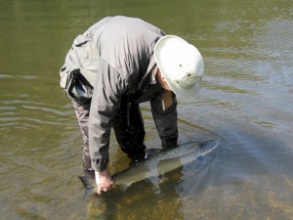Case study:Salmon Conservation
Project overview
| Status | In progress |
|---|---|
| Project web site | http://www.wyeuskfoundation.org/projects/salmonconservation.php |
| Themes | Economic aspects, Fisheries, Habitat and biodiversity |
| Country | England |
| Main contact forename | Stephen |
| Main contact surname | Marsh-Smith |
| Main contact user ID | |
| Contact organisation | Wye & Usk Foundation |
| Contact organisation web site | http://www.wyeuskfoundation.org/ |
| Partner organisations | Migratory Salmon Fund, Environment Agency |
| Parent multi-site project | |
| This is a parent project encompassing the following projects |
No |
Project summary
What is the value of a salmon? This varies according to who catches it. To a kingfisher or goosander a young salmon is a tasty meal. To a poacher or commercial netsman it is up to £15 per lb. To the rural economy each one caught on rod and line is worth £4,000+, whilst to a fishery's capital value it is worth around £12,000 per fish caught each year, whether kept or released. To someone caught with an illegally taken fish it is worth minus £1,000! To those concerned with restoring a depleted salmon run, a fish left in the river to breed is priceless.
With that last point in mind, what has the Wye & Usk Foundation done to conserve and increase the number of fish on the redds?
1. 2000 - we bought off the Severn Estuary drift nets for good with funding from owners, MSF (Orri Vigfusson's Migratory Salmon Fund), concerned trusts and fishermen.
2. Also in 2000 we signed up the Goldcliff putchers (upstream of Newport) to a five year moratorium.
3. 1998 - we launched a catch and release scheme to reward anglers who returned spring salmon alive to the river. This was superseded by the national byelaws 1999, which made the return of all salmon before 16th June mandatory.
4. 2003 - we introduced another River Wye Catch and Release incentive scheme from 16th June to the end of season.
5. 2003 - we pressed hard, despite the unpopularity, to have worming, shrimping and prawning banned on the Wye. They were later that year.
6. We joined with the Wessex Salmon Trust to provide evidence for the EU complaint against the Irish drift nets. In 2007, all legal Irish drift netting ceased.
7. 2008 - Environment Agency Wales permanently bought out Goldcliff putchers after extending moratorium
8. 2010 and 2011 - WUF and Environment Agency bought off the Lydney Park Putchers pending introduction of strict catch limits. From 2012, enabled by the Coastal and Marine Act, this is fixed at 30 salmon p/a.
9. 2012 - another byelaw made it compulsory to release all Wye salmon throughout the season.
The Benefits:
In the Estuary: Averaged over the last decade, over 2,000 salmon p/a will be freed to spawn the Wye & Usk rivers but in all probability, many more than that. For the first time since Roman times salmon have free access beyond the estuary nets and traps.
On the Wye, although voluntary catch and release rates rose from 7% in 1996, to over 70% in 2010, this was not enough to stave off a bylaw which was introduced in June 2012. The Wye's recovery will no longer be held back by legal exploitation.
On the Usk (June 2012) we urge that as many as possible Usk salmon are returned after the current mandatory catch and release period finishes on 16th June. The Usk is not reaching its conservation target. At the very least, all coloured fish and hens are returned after that date, pending whatever action Environment Agency Wales proposes for the future.
Monitoring surveys and results
Lessons learnt
Image gallery
|
Catchment and subcatchment
Site
Project background
Cost for project phases
Reasons for river restoration
Measures
MonitoringHydromorphological quality elements
Biological quality elements
Physico-chemical quality elements
Any other monitoring, e.g. social, economic
Monitoring documents
Additional documents and videos
Additional links and references
Supplementary InformationEdit Supplementary Information
| ||||||||||||||||||||||||||||||||||||||||||||||||||||||||||||||||||||||||||||||||||||||||||||||||||||||||||||||||||||||||||||||||||||||||||||||||||||||||||||||||||||||||||||||||||

